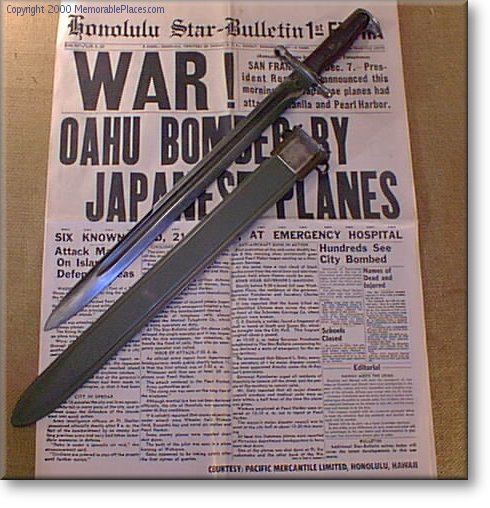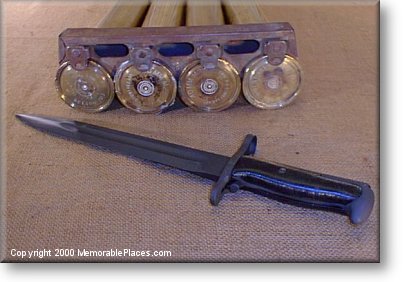|
There were actually a large number
of different bayonets used on the M1 Garand Rifle.
Any of these would be correct for a simple M1 collection
in our opinion as older rifles were used right up
until the Vietnam war. This page will be completed
if and when our bayonet collection ever grows.
The following quick
M1 Garand Bayonet rundown was provided by: Greg
Robinson to whom we am very grateful.
* * *
MODEL 1905.
Made by Springfield Armory and Rock Island Arsenal
from 1906-1922. 16" blade, originally bright
polished finish, then blued, then parkerized. Scabbards
were the Model 1905 (all leather) and Model 1910
(canvas and leather)
MODEL 1905
Same as above with 16" blades. Parkerized finish.
Not nearly as well made as the arsenal made bayonets.
Made by commercial contractors. Made by Utica Cutlery,
Oneida Limited, Wilde Drop Forge and Tool, Pal Blade
and Tool, American Fork and Hoe, and Union Fork
and Hoe. Scabbards same as above plus the M3 fiber
scabbard adopted 1941. 1942-1943
MODEL 1905E1
16" blades as noted above and cutdown to 10"
blades. Cutdown by same commercial contractors which
made the WW2 production M1905. 1943 M3 scabbard
cut down to 10" with nomenclature M3A1.
M1 10"
Parkerized finish. Made by American Fork and Hoe,
Oneida Limited, Union Fork and Hoe, Pal Blade and
Tool, Utica Cutlery. 1943-1945. Some production
in 1953. M7 scabbard
M5/M5-1/M5A1
6" blade. Made by Aerial Cutlery, J&D Tool,
Imperial Cutlery, Milpar Columbus, and Utica Cutlery.
Adopted in 1953.
* * *
old Springfield bayo or pic needed
Will add one when we acquire this bayonet.
19XX sixteen
inch bayonet originally intended for the Springfield.
Interestingly, when
originally constructed, the M1 was designed so that
the still-in-issue bayonets from the 1903 Springfield
Rifle could also be used.

1942 Model
1905 sixteen inch bayonet on reproduction paper
of Pearl Harbor Attack.
Early in World War
II the military planners still believed that a long
bladed bayonet was an important part of the soldiers
personal arsenal. As was the case in W.W.I, (which
saw widespread trench warfare), it was thought that
an extended reach would give soldiers an edge in
abilities over the enemy. The early war bayonets
were therefore made in the same general pattern
as the early Springfield bayonets. Early W.W.II
bayonets sported a 16 inch blade and were issued
to soldiers with their M1 rifle. The above bayonet
is a Model 1905.
cut down bayo or pic needed
Will add one when we acquire this bayonet.
19xx 10
inch bayonet. This is a cut-down version as you
can see from the length of the so-called blood groove
which goes all the way to the point.
As the war progressed
many of the tactics used in W.W.I were found to
be invalid and it was determined that a 16 inch
blade was no longer the best choice. At this point
the 16 inch bayonets, (both the W.W.I variety and
the ones that were made early in the war), were
cut down to a blade length of 10 inches.
Good knife steel was
scarce and so the effort of cutting the old knives
down made sense and saved precious weapon steel.
Unfortunately it also made the older W.W.I bayonets
very rare and the early war 16 inchers quite collectable.
You can tell one of these cut-down bayonets by noting
that the 'blood groove' runs all the way to the
point of the blade.

10 inch manufactured bayonets were used later
in the war. You can see a rack of 40 mm Naval shells
in the background.
As the war continued
on the need for bayonets did not diminish and of
course new bayonets were made on the new 10 inch
design. This is one of those bayonets.
insert new type attachment bayo
here
Will add one when we acquire this bayonet.
19xx bayonet.
Note the mechanism for hooking it to the rifle has
changed.
After World War II
ended another bayonet was developed for the M1 with
a somewhat different mode of attachment.
Insert new type attachment &
OLD bayo with rifle here
Will add one when we acquire this bayonet.
The two
ways of attaching bayonets to an M1.
Click here for some more
M1 Garand Bayonet Pictures.
This
page was last updated on: March 14, 2002

|

